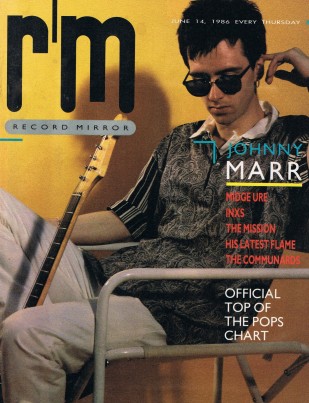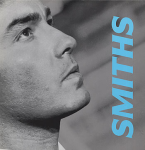1986:
June-July
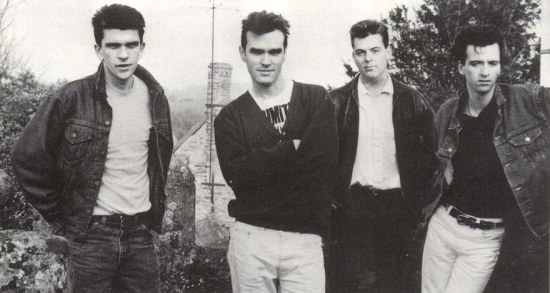
Photo of The Smiths by Pat Bellis. Reproduced without permission.
ALBUM REVIEWS
THE QUEEN IS DEAD - released June 1986
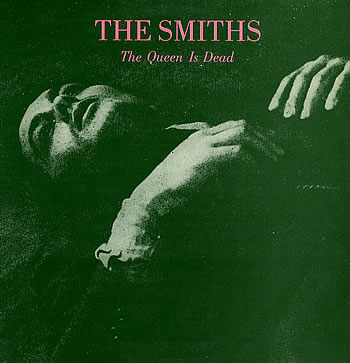
LONG LIVE THE KING!
"THINGS ARE not always as they seem. When The Smiths appeared on Whistle Test a few weeks ago to promote the 'Bigmouth Strikes Again' single, even their most committed fan would have been forgiven for thinking that our most eminent jangling jewels were finally beginning to lapse into self-parody.
There on the screen was the Prince Of Pain, the finest furrowed pate in pop, replete in the same old faded denims and that bloody awful hearing aid, bleating on about how he felt like Joan Of Arc and had no right to take his place in the human race.
Behind him, meanwhile, a four-piece band were coming on like the new Rolling Stones, all rounded rock maturity and polished cocksure authority. With a crucial third LP on the horizon, it was as if the skin of their beat had finally fully ripened; as if they had defined and perfected their musical pitch and lost their hunger, their need to grow.
But things are not always as they seem. If ‘The Queen Is Dead' arrives in a climate of such doubt, with the above suspicions compounded by stories of "personal differences" within the group and problems with their record label without, it is pleasing to report that it is as exciting and direct a pop or rock record as we are likely to hear this year - a challenging and often extreme piece of work.
While their last LP left off with the torpid 'Barbarism Begins At Home' and the meandering whine of 'Meat Is Murder', 'The Queen Is Dead' goes straight for the jugular. In becoming what is basically a beat group again, The Smiths have rediscovered much of the muscular tautness of their earliest session recordings, the cuts immortalised on the 'Hatful Of Hollow' compilation.
The title track, prefaced with a few bars of Cicely Courtneidge's "take me back to dear old Blighty", positively erupts into a quasi-rock anthem that Simple Minds or U2 would probably be proud of. The Queen Is Dead' opens the LP with crashing chords, rattling tom tom drums and a bassline that pumps like a car jack and cranks like a spanner, Morrissey's singing scanning brilliantly to counterpoint the beat. Smiths detractors will often belittle the man's larynx, forever cringing at his whingeing. What they conveniently overlook is the great sense of timing and phrasing he brings to his dramatic vocal delivery, his sense of the rhythmic beast behind him never less than acute.
The Queen Is Dead' is, of course, at least partly allegorical, referring as much to Morrissey's nostalgic yearning for a certain lost Englishness as to the redundancy of the monarchy. The miserable undertow to the Morrissey muse is also introduced in the nagging refrain "life is very long when you're lonely", as is the sense of humour which provides an often black and farcical antidote throughout the album: "And so I broke into the palace/With a sponge and a rusty spanner/She said: ‘I know you and you cannot sing’/I said: ‘That's nothing, you should hear me play the piano’.”
The wit surfaces again on 'Frankly, Mr Shankly’, Morrissey's "fame, fame, fatal fame” song. Couched as a letter or speech of resignation from a mundane job, its humour is as much musical as lyrical, the "worker Smiths" Rourke and Joyce etching out a deliberately hammy helping of cod skank ("reggae is vile", anyone?), with an ironic nod to northern working club cabaret. If anything, the track would perhaps have benefited from an even more exaggerated music hall treatment.
But that is not to fault an unsung rhythm section who maintain an adroit peak of sustained excellence. For all the tales of dissent in the camp, they remain a fine bedrock vehicle for Morrissey's lyrical fancies and Marr's flowery colourings.
Any fears that The Smiths' considered return to insidiously catchy, unashamedly beat roots is being made at the expense of their more melancholic, lilting moods are dispelled on the haunting 'I Know It’s Over’. Six minutes that stand comparison with the likes of 'Back To The Old House' and 'This Night Has Opened My Eyes', the song is a languid lament that shows The Smiths' more poetic leanings intact and far from crushed by their new beatbound power.
On an LP of only isolated lowpoints, the nadir of the first side - and indeed the whole album - is the virtually impenetrable 'Never Had No One Ever' in which the salty dog seems to think he is 'Sergeant Pepper' or at least an out-take of the same. A slow, brooding melodrama with dippy psychedelic undertones, it is a poor man's 'How Soon Is Now’, minus the latter's lyrical charm and alluring Bo Diddley-esque backbeat.
The following track, in contrast, lies on consecrated ground. ‘Cemetry Gates' is set in a graveyard, but its true target is the crime of plagiarism, a tactic just occasionally employed by the songwriter himself ("talent borrows, genius steals" is teasingly etched on the run-off groove of the 'Bigmouth' single). And, in keeping with the tone of musical irony set earlier on 'Frankly, Mr Shankly', the deft breeziness of the instrumentation - acoustic guitars double and treble tracked in a jaunty cascade - wittily belies the grave subject matter.
With the exception of 'Meat Is Murder' - recorded and mixed, anyway, in 1984 - last year was hardly a vintage one for The Smiths. Most worrying was a discernible fall from grace concerning their position as the nation's most natural and consistent singles band.
The group's first four singles - 'Hand In Glove', This Charming Man', 'What Difference Does It Make' and 'Heaven Knows' - formed a staccato quartet of practically unimpeachable greatness. For an opening salvo, perhaps only the first four Sex Pistols singles - the only Sex Pistols singles - come close in terms of their classic worth. But any comparison between that initial run of Smiths-on-45 with their four most recent efforts – ‘That Joke Isn't Funny', 'Shakespeare's Sister', 'Boy With The Thorn In His Side' and the current 'Bigmouth' - illustrates just how sharply the standards have fallen. Morrissey made his reputation as one of the most concise contemporary pop songwriters largely on his skill in the singles arena, a knack which he seems, at least temporarily, to have lost.
The inclusion, therefore, of the band's last two singles on this LP is not really the inducement to buy that the sticker on the sleeve suggests: 'Bigmouth' finds Morrissey at his most testingly wry, but is really little more than Smiths by numbers; ‘The Boy With The Thorn In His Side' (Ben Wan perhaps?) details a familiar search for love in a looking glass world, but is a non-song by Smiths standards.
Better looking by far - in its music, its message and its humour - is the racy 'Vicar In A Tutu', a song that would have made a great single. A fanciful tale of transvestism in the clergy that could have been culled from a Carry On film, it reverberates with some superb quickfire couplets: "As Rose collects the money in a cannister/Who comes sliding down the bannister?/The vicar in a tutu/He's not strange/He just wants to live his life this way."
The music is spendidly souped-up rockabilly, guitar man Marr finally rubber-stamping his metamorphosis from That Chiming Man to The Boy With The Twang In His Strang. It sometimes seems as if he is delving further back into his rock'n'roll roots with each successive LP. If last year's 'Rusholme Ruffians' contained one unashamed reference to a vintage Elvis hit with a guitar riff lifted straight from 'His Latest Flame', then 'Vicar In A Tutu' contains another, with the rhythm and tempo of the track harking back to the manic skiffabilly of ‘That's Alright Mama'.
And if 'Tutu' steals from the Sun sessions, the subsequent ‘There Is A Light That Never Goes Out' hijacks a treasured Motown memory, that of Marvin Gaye's 'Hitch Hike' ("talent borrows, genius raids jukeboxes!").
Again, however, Marr's homage to rock history is executed with such fluent aplomb that the 'musical quotation' dovetails delightfully with the tenor of the song. The only odd thing is that Marr's musical obsessions should lie so obviously in rootsy American pop while his singer's cultural ones are so blatantly and quaintly English. When the two gel, however, they complement brilliantly, and ‘There Is A Light' is another pearl, the flute-like flutterings of Marr's string arrangement providing the perfect curtain for Morrissey's latest paean to blessed celibacy.
As an album with humour never far from its surface, it is fitting that ‘The Queen Is Dead’ should conclude with the clipped, undulating frivolity of 'Some Girls Are Bigger Than Others', a hypnotic musical travelogue that verges on the transcendental: "Some girls are bigger than others/Some girls' mothers are bigger than other girls' mothers." Again, the Morrissey muse and Marr's musical setting collide marvellously, the track illuminated by some lovely slide guitar from the latter. It would have made another classic Smiths single.
So ‘The Queen Is Dead' is an excellent record, let down only by one spot of neo-psychedelic posturing and a couple of mediocre singles. Sure, the age-old concerns are well to the fore, but they have never been so powerfully or eloquently expressed. The man-child remains self-obsessed and often wilfully miserable, but also self-deprecating and often very funny. The band's loyal legions will love ‘The Queen Is Dead', but even the doubters should find something in the uncanny catchiness of seven of these ten tracks - a good ratio by anyone's standards these days.
Maybe the next LP, or perhaps even the forthcoming 'Panic' single, should be the quantum shift in musical emphasis that some expected from this set. But, for now, Britain's best band are sticking very agreeably to what they do best, simply being The Smiths.
As Antony said to Cleopatra as he opened a crate of ale, some albums are better than others."
Adrian Thrills
New Musical Express, June 14, 1986
Reprinted WITHOUT PERMISSION for non-profit use only.
See the original review here
NATIONAL ANTHEMS
"This is neither the time nor the place to indulge in trivial banter; suffice to say that The Smiths' peculiar career manoeuvres, which have caused their audience much exasperation of late, are rendered utterly obsolete by the splendour of "The Queen Is Dead", the album which history will in due course denote as being the key work in forcing the group's philistine opposition to down chisels and embrace the concept of The Smiths as the one truly vital voice of the Eighties.
By their third album (I'm not counting "Hatful Of Hollow"), most groups have commenced losing their grip on greatness - but not these young trojans. Indeed, "The Queen..." is considerably more substantial than "Meat Is Murder", deserting the latter's occasional sixth-form conceits for a lyrical overview as wickedly droll as it is devastatingly acute.
The whole of the first side is nothing less than perfection, commencing with a title track of epic worth. Driven by a vicious drum tattoo, bonecrunching bass and a snarling viper-like wah-wah guitar vamp, Morrissey unveils a lyric that mixes verbal slapstick with withering insight to document the hideous reality that currently exists as a sluttish excuse for dear old Blighty.
"Frankly, Mr Shankly" is an equally robust and adroitly worded piece of Morrissey autobiography which finds him invoking the ghost of George Formby while Marr and Co underscore the vaudeville with ingenious tension-and-release dynamics.
"Never Had No One Ever" is, at a guess, Marr's tribute to Raw Power-era Stooges (with a nod to 'Heartbreak Hotel'), just as "What She Said" was The Smiths's musical homage to The MC5. His guitar orchestrations here are absolutely stunning: each layer finally merging to create an utterly hypnotic epilogue of a coda.
"Cemetry Gates" is the most pastoral effort here: a gorgeous loping gambol backing up Morrissey's most elaborate and dexterously rhymed stanzas. After such triumphs, side two is slightly disappointing to these ears, but there is a reason for this. "The Boy With A Thorn In His Side" should not have been included, I feel ('Unloveable', the giveaway track with the 12-inch of "Bigmouth" would have been infinitely preferable), while both "Bigmouth" itself and the potentially remarkable "There Is A Light" - both great songs - simply don't live up to the live versions performed on the last series of gigs. The latter in particular suffers from an arrangement utilising synthesised strings and the like, which simply detracts from the thrust of the performance, making it sound camp, something Morrissey and Co have to avoid at all costs. "Vicar In A Tutu" and "Some Girls Are Bigger Than Others", sensibly restrained arrangement-wise, may well be lesser songs but, constructed within their rightful limitations, sound absolutely stunning.
I've saved the best to last. Back to side one, track three. "I Know It's Over" is simply the finest piece of music The Smiths have produced. The song is essentially about loss of innocence or, in my interpretation, of romantic idealism, and is the first piece of music since Frank Sinatra's "One For My Baby" to have brought me to tears. Morrissey has always been pop's most underrated vocalist, but here his performance is literally devastating. Marr, Rourke, and Joyce keep things spartan, stripped back, gradually building until the climax affords them the rein to almost explode. Yet Morrissey's voice is so totally in control of the dynamics that they shine simply by underpinning his every inflection. The performance and the song are stunning beyond words.
There's so much that I could write about this record, about The Smiths and why I still fervently believe they stand head and shoulders above the rest. Unfortunately, this context is way too limiting to properly express said feelings. Suffice to say this group is the one crucial hope left in evoking a radical restructuring of what pop could - nay, should - essentially be evolving towards. "The Queen Is Dead" will help bury the one-dimensional misery-guts attitude so beloved of the group's denigrators, while further displaying to all and sundry the simple fact that this is essentially music brimming with valorous intent. The Queen is dead, England in ruins, but here, in the marrow of this extraordinary music, something precious and inately honourable flourishes. The thrill is here, right enough."
Nick Kent
Melody Maker, June 14, 1986
Reprinted WITHOUT PERMISSION for non-profit use only. Photo of Morrissey by Lawrence Watson. Reproduced without permission.
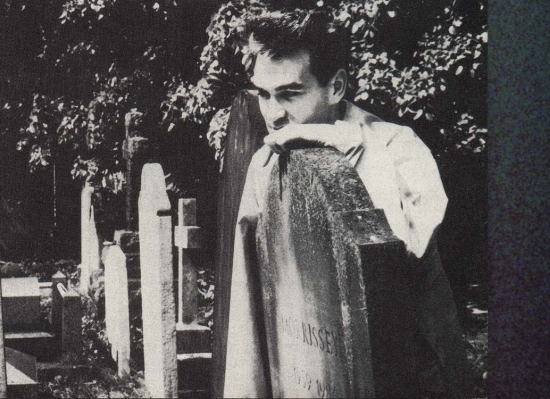
See the original review here
SEE ALSO: Record Mirror , Sounds and Spin reviews
Marr Speaks!
in the June 14th issue of Record Mirror. Click on magazine cover to view
SINGLE REVIEWS
PANIC - released June 1986
Smiths of the Week
"Just when you thought it was safe to write off The Smiths as the ultimate albums band, here comes 'Panic' to re-establish Morrissey and Marr as undisputed champions of pop's most vital artform. As well as being thoroughly superior to the rest of this week's crop, 'Panic' should also finally knock the dour bastards myth on the head once and for all. The very thought of Morrissey ever getting involved in anything more dangerous than a nosebleed is funny enough, but when he brings the young lad in at the end for the 'hang the deejay' chant, it's impossible not to join in and echo the sentiments of anyone who has ever once attended a youth club disco. 'The music that they constantly play says nothing to me about my life,' croons Mo, but a few blasts of 'Panic' and that particular situation will soon be put to rights. Johnny Guitar hasn't sounded as damned EMPHATIC since 'Hand In Glove' and with 'Vicar in a Tutu' and a ludicrous instrumental funk workout on the 12-inch, it sounds as if The Smiths are back with a vengeance. Brillliant."
Unknown reviewer
Melody Maker, June 26, 1986
Reprinted WITHOUT PERMISSION for non-profit use only.
See the original review here
"Hang the DJ! Steve Wright? Yes! No messing. A stunningly astute critique of pop-culture under late capitalism leads Morrissey to the conclusion that terrorism is the answer. In this he is wrong of course. Individualistic action is no substitute for the action of the masses but at least he is sussed enough to realise that lynching - being a group activity - is superior to those methods of assassination that require a knowledge of technology that is not available to ordinary working people. Whilst our support of The Smiths is this instance must be critical it is also wholehearted and without reservation.
This from a man who didn't have a job and then he found a job and God knows he's miserable now, etc, is pretty good going. This is the first Smiths single that uses a different tune and that manages to avoid ropey introspection and clever-clever adolescent poetry. The lads in the office tried to hide this record from me. They thought that my previous condemnations of the Mozzer were based on blind unthinking hatred and unjustified prejudice. Far from it. I always believed it when they told me that the man was a genius, I merely awaited proof. It now seems as if my goading has borne fruit."
Steven Wells
New Musical Express, June 26, 1986
Reprinted WITHOUT PERMISSION for non-profit use only.
ARTICLE
This article was originally published in the June 28, 1986 issue of No. 1.
BIGMOUTH STRIKES AGAIN
The Smiths are back, and that means more rantings from the original "old misery guts", Mr Steven Morrissey. MAX BELL listens very carefully. Pics by IAN MCKELL
Once upon a time, during the early days of glam rock, a teenager called Steven went to the Manchester Apollo to see Roxy Music. Loitering round the backstage door beforehand, Steven was rewarded with a vision that shaped his entire life. What he saw wasn't Roxy Music in their decadent glory but Roxy's tour bus, and hanging from its door -- Brian Eno's psychedelic ostrich feather cape. Morrissey, for the lad was he, recalls the incident with a tremor.
Thirteen years later Morrissey, now turned 27, comes across Roxy singer Bryan Ferry in a studio, only this time the parties are more equal. "I didn't bother asking him for his autograph. I'd had it since I was 14." To finish the tale, Ferry asked Johnny Marr to play guitar on his new LP only weeks after Rolling Stone Keith Richard had called up the mop-haired wonder boy; proof that if you're a good boy and eat all your spinach one day you can emulate your heroes.
S.P. Morrissey is something of an intellectual squirrel. While he doesn't keep a diary he remembers everything from his past and stores it away, not just the musical artefacts of youth like his front row David Bowie ticket ("seven shillings and six pence!") and his records, but aspects of his own upbringing which most of us would conveniently file away under Out Of Date.
There are several versions of Morrissey's story. The one about "never being a teenager. I was the one with the furrowed brow and the rolled up New Statesman. I've caught up now with my teenage years and it is a great social embarrassment I can tell you," is familiar.
But of course there is more to Morrissey than the boy who hung around parks and cemetries reading poetry. There's also the pop fan. In the golden age of the glam Top Of The Pops Morrissey got girlfriends to make him David Bowie costumes.
1986 is just beginning for the Smiths. Bigmouth is back and on form with a new LP 'The Queen Is Dead' indicating that Morrissey is not overkeen on the Royals.
"They are so staid and uninteresting. Has Diana ever uttered a sentence of any vague interest or use to the world?
"The establishment -- the Monarchy and the government -- don't care as far as I can see. Many of them are of advanced years but they do nothing for old people. People in Britain are dying from poverty and cold because they can't afford heating. Others will never ever work again. But if you say these things people stare at you as if you're mad. If Live Aid had been about English poverty it would never have got off the ground, never received a minute's airplay. Because it was far away and somehow glamorous you could get lost in the charitable hypnosis."
The Smiths in 1985 had troubles of their own. Bassist Andy Rourke had "personal problems. He was ill and it seriously invaded the Smiths, it infested our place. He rejoined because his leaving seemed more wrong than his staying. It was too easy to turn like a pack and say 'You're useless! Get Out!'. Now Craig Gannon has also joined we sound more formidable as you'll hear on the next single 'Panic', so perhaps Andy's brief departure was a benefit."
Rourke's troubles weren't helped by legal battles between the band and their company Rough Trade which prevented 'The Queen Is Dead' from being released in February. Last year's album 'Meat Is Murder' also ruffled too many prickly consciences and the Smiths felt the backlash on a trio of singles, 'Shakespeare's Sister', 'That Joke Isn't Funny Anymore' and 'The Boy With The Thorn In His Side'.

In 'The Queen Is Dead' Morrissey still protests loudly but he is more relaxed.
On the inner sleeve of the album the band are standing outside the Salford Lads Club in the real Coronation Street and Morrissey is smiling!
"We took our lives in our hands getting that photo. While we were setting up a gang of ten-year-old girls came and terrorised us. Everyone in the street had a club-foot and a vicious dog!"
Morrissey chose that location because he associates it with another hero, the actor Albert Finney, star of the magnificent 60s film Saturday Night and Sunday Morning.
"Finney was the Northern boy made good which is why I can relate to him even more."
"I find that mood of a Northern person going to London and then returning home very poignant. You can't describe how you feel when you go from South to North, stopping at the service stations. It hits a deafening note. The beauty of Finney was his natural quality as an actor. Even when I'm asleep I can't look natural."
While Morrissey says he hates nostalgia he admits that not much excites him about the 1980s. The closer he feels the 21st Century breathing down his neck, the more he panics.
Morrissey is so far removed from the jet setting image of the happy-go-lucky pop millionaire that people assume he is an old misery guts. When you meet him this isn't true at all. He is extremely funny and delivers many statements knowing they should be taken with a hefty pinch of salt.
"My self view is that I'm more cynical than romantic and I do appreciate the value of sarcasm. I'm not a jolly character, a life and soul of the party type and I suppose I asked for the misery tag. I just didn't expect such a generous response! However I dispute that I'm the Ambassador of Misery."
"I'm still embedded in a fascination for suicide and intensified depression. I feel a great deal inside me that must be tapped. I have to sing about what is ensnared in me."
Suicide, depression, death! All good grist to Morrissey's mill. His current favoured form of relaxation is visiting London cemeteries with old Manchester pal Howard Devoto (ex-Buzzcock).
"It's a most gripping pastime I can assure you. Gravestones have a very dreamlike quality. It's a private pleasure that Howard and I share because we're such boring people."
Conversation turns from the morbid to the macabre. He goes on to talk about the Moors Murders case, the Chalk Pit Murders, mass murder in the past 100 years and is an expert on the cannibal Edward Fish ("You passed on just one Mr Morrissey") but then he starts spluttering. "I can't imagine this boosting record sales! I must stress I have no personal interest in murder, I'm not nurturing any plans but I may give it some thought in the future. It's a good job for you I don't have a back garden. Any minute now I shall press a button and your armchair will disappear through the floor."
Reprinted WITHOUT PERMISSION for non-profit use only.
See the original article here
LIVE REVIEW
Newcastle Mayfair - July 17, 1986
'The Queen Is Dead' tour (first UK leg)
"WE'RE HUDDLED together (2000 of us) in the home of heavy metal, witnessing the early disturbed sound of 'Bigmouth'. But thankfully they're just warming up; with Morrissey revealed as a shy thin man eternally trying to capture his shirt-tails. His presence alone makes The Smiths a unique live force; Joyce is buried beneath drums, Rourke's like a zombie, new recruit Gannon's as stiff as a juvenile Ed Collins, while Marr - the brilliant budgie - calmly controls our changing moods. The new Rolling Stones? Don't talk crap. Jagger never really meant it.
"Eh I know you and you cannot sing", we chant at Morrissey during 'The Queen Is Dead' and yet here we are, lapping up his every heartfelt yodel, hanging DJs on his every word. Because those of us of a melancholy hue - who are prone to bouts of debilitating self-pity and a little in love with death - find reassurance in these lyrics. His open-hearted poetry is guilded with a passionate humour which only the insensitive, the deaf and the emotionally deformed choose to reject.
Live there's a marvellous bond between us. Perhaps this music is less infectiously danceable, less call-and-response orientated than, say, Trouble Funk, but the latter says little to me about my life. For me, Morrissey deals with the very real, very individual concerns. Maybe it's this obsession with uncertainty, with mortality, these intimations of the grave: "Mother I can feel the soil falling over my head" - tonight's rendition of 'I Know It's Over' features his finest live vocal to date.
The music of Joy Division and The Smiths "is a catharsis for the artist and works as a catharsis for the listener". Precisely, my dear colleague Watson. For here we are releasing our fascination with death ('Cemetry Gates'), rememberance for lost loved ones, failed affairs ('I Want The One I Can't Have') and unnatural emotions. Perhaps I'm taking all this too seriously, but the only certainty is that nothing is certain.
Those who have never seen The Smiths accuse Morrissey of being a miserable, egotistical, arrogant bastard. Yet live, in the flesh, these criticisms evaporate because it's all part of his tongue-in-cheek, self-deprecating humour. He's seriously obsessed with the elevation of beauty ("That which the bourgeois call ugly" - Wilde), with overturning conventions and establishing meanings. Mixed in are trivial everyday concerns with hair, shoes, the cut of his trousers and "the 21st century breathing down my neck".
Of course, without the music, few would listen to him. Magical highlights here included Marr's metal guroove (sic) on 'Panic' and the new 'Ask', Joyce's furious beating on 'Shakespeare's Sister' and Rourke's groin-twanging bass on the 'His Latest Flame/Rusholme Ruffians' medley. But it comes to an end too soon when several phlegm-throwers dampen the sun that shines out of his behind. Perhaps Morrissey's flirtation with a cretin-hopping gabba-gabba banner reading 'The Queen Is Dead' transported the resident morons back to barbaric punkdom.
And will "fame, fame, fatal fame" go to Morrissey's head? The graveyards are full of indispensable people and he can't forget it. But perhaps it's inevitable that an inferior lyric hitched to a repetitive Marr riff must one day turn The Smiths into superstars. Then Fleet Street will hound him and the dream will be over.
"Are you good to go?" Er, maybe, but where are we going and what will we do when we get there?"
Len Brown
New Musical Express
Reprinted WITHOUT PERMISSION for non-profit use only.
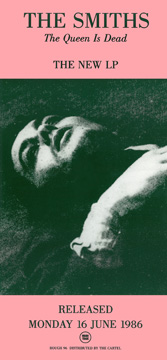
'The Queen Is Dead' promotional poster
